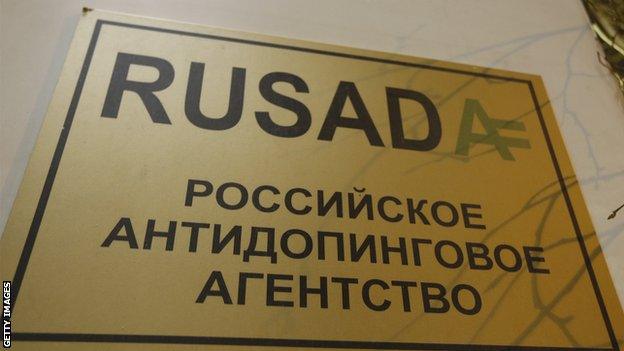Russia doping ban: Wada tried to help Rusada lift ban in May
- Published

Wada has recommended ending Rusada's three-year suspension
The World Anti-Doping Agency (Wada) proposed a compromise with Russia in May that would allow a suspension of its anti-doping agency (Rusada) to be lifted.
Wada director general Olivier Niggli advised Russia's Sports Minister Pavel Kolobkov on how to improve the country's chances of readmission to international sport.
In the correspondence - obtained by the BBC - Niggli suggests an addition to a letter from Russia's key sports organisations that "could ensure...positive recommendation" from Wada's Compliance Review Committee (CRC), which was due to meet two weeks later.
The BBC previously obtained a letter from Niggli and Wada president Sir Craig Reedie sent to Kolobkov in June that suggested a compromise with Russia.
The revelation comes as Wada's Executive Committee meets in the Seychelles on Thursday to decide whether to reinstate Rusada, which has been suspended since 2015 following a major doping scandal.
Last week, the CRC recommended reinstatement, saying Russia had "sufficiently acknowledged" failings.
Wada originally insisted Russia meet two strict criteria as part of a 'roadmap' for returning to compliance:
Publicly accept the findings of the 2016 McLaren report after an investigation revealed an extensive, government-backed cheating conspiracy
Grant access to its drug-tainted Moscow laboratory, providing the data necessary to ensure justice on hundreds of outstanding cases
However, the BBC then revealed details of concessions on both conditions suggested by Niggli and Reedie to Kolobkov in June.
Wada robustly defended the softening of its position, and published a raft of correspondence with Kolobkov, "in the interest of full transparency", but news of a compromise arrangement sparked outcry from athletes' groups and national anti-doping agencies.
Details of negotiations between the two sides in an earlier letter sent the previous month by Niggli to Kolobkov - and not published by Wada - can now be revealed.
Dated 30 May, Niggli refers to a previous letter signed by the Russian Sports Minister and the country's Olympic and Paralympic Committees, due to be studied by the CRC at its next meeting a fortnight later.
Niggli says he is "reaching out" to Kolobkov because "we think that whilst the letter is close to meeting the requirements of the roadmap, there might still be issues."
The Swiss warns Kolobkov that "a negative recommendation by the CRC will be problematic for a decision to then be taken by the executive committee accepting that the letter meets the requirements of the road map.
"However, we think that a small addition to the letter, if acceptable to you, could ensure that the letter is well received by the CRC and that a positive recommendation is provided."
The 14 May letter from the Russian authorities failed to meet one of the two key conditions for reinstatement - publicly accepting the outcomes of the McLaren report.
Instead, it included a more general admission that "the serious crisis that has affected Russian sports was caused by some unacceptable manipulations of the anti-doping system revealed in the investigations conducted under the auspices of Wada".
Niggli advises Kolobkov to add the following line to that sentence: "involving a number of individuals within the Ministry of Sport and its subordinated entities".
Niggli tells Kolobkov that "this would allow all of us to move forward positively" and reassures him that "no name is being mentioned and we are strictly limiting this addition to wording used by [International Olympic Committee disciplinary commission chair Samuel Schmid]."
The IOC's Schmid Report largely backed up Wada's McLaren report as it outlined the involvement of Russian Ministry officials in the alleged state-sponsored doping scheme. But crucially it removed references to state knowledge of the doping system, or the role of the FSB, Russia's principal security agency.
Niggli's advice was ignored by Kolobkov, and the CRC then recommended that Rusada remain suspended when it met in June.
But despite initially demanding an explicit admission of state involvement, the CRC were eventually satisfied with Kolobkov's admission - in a further letter last week - that Russia "had fully accepted the decision of the IOC Executive Committee, that was made based on the findings of the Schmid report".
However, Niggli's apparent willingness to compromise with Kolobkov may surprise some. Two weeks before sending the letter the Wada director general said the dispute would continue until Rusada had fulfilled the original conditions.
A fortnight later, Niggli appears to have softened his stance.
When contacted by the BBC, a Wada spokesman said the correspondence would be considered by its 12-strong executive committee when it meets on Thursday.
Rusada was suspended after it was accused of covering up drug abuse - including while the country hosted the 2014 Sochi Winter Olympics.
Russia has repeatedly denied running a state-sponsored doping programme and continues to retain control of its Moscow laboratory.
The issue has escalated into arguably the gravest crisis in Wada's history, with Beckie Scott, the chair of its athletes committee, resigning in protest, and vice president Linda Helleland vowing to vote against Rusada's reinstatement.
The athletes' commission of the IOC however said it "agreed in principle" with the CRC's recommendation to end the suspension.